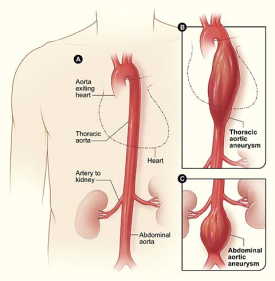Aortic Aneurysms: Who’s At Risk?
BIDMC Contributor
MARCH 27, 2019

Left untreated, an aortic aneurysm can continue to grow until it ruptures or causes a tear between the layers of the artery, also known as a dissection.
“A ruptured or dissecting aortic aneurysm is a life-threatening situation,” says Brett Carroll, MD, Medical Director of the Aortic Center at Beth Israel Deaconess Medical Center.
Aortic aneurysms rarely show symptoms, so it’s often difficult to diagnose without proper screening.
“Most people with aortic aneurysms don’t have symptoms until a tear or rupture has occurred, which is usually accompanied by sharp, sudden pain,” Carroll says. “But with proper screening, we can monitor its growth and intervene before a complication occurs.”
 Aortic aneurysms can develop anywhere along the aorta, which runs from your heart through your chest and abdomen. When they occur in the chest, they are called thoracic aortic aneurysms.
Aortic aneurysms can develop anywhere along the aorta, which runs from your heart through your chest and abdomen. When they occur in the chest, they are called thoracic aortic aneurysms.
“These aneurysms are usually age related, occurring most commonly in people ages 65 and older,” Carroll says.
In addition to age, other risk factors include:
- High blood pressure
- Family history of aortic aneurysms
- Connective tissue disorders
An abdominal aortic aneurysm is more common than thoracic, occurring in the part of your aorta that's in the abdomen. This type of aneurysm occurs most frequently in men, ages 65 and older. Additional risk factors include:
- History of tobacco use
- High blood pressure
- High cholesterol
- History of other aneurysms in your body
- Family history of aortic aneurysms
“If you meet any of the criteria, you should ask your doctor about having an aortic aneurysm screening,” Carroll says.
Your primary care physician can conduct the simple screening for an abdominal aortic aneurysm, which is covered by insurance if you are:
- Between the ages of 65 and 75 years old and have a family history of an abdominal aortic aneurysm, or
- A man who has smoked more than 100 cigarettes in your life.
“If your doctor sees a concerning finding, s/he can refer you to a specialist,” Carroll says.
The Aortic Center at BIDMC is a national leader in the treatment of aortic disease.
Aortic Center Services Meet Our Aortic Center Team
